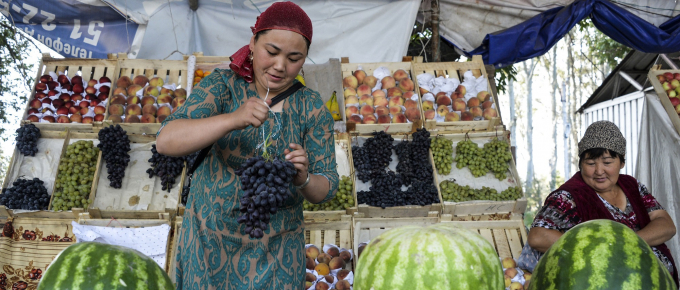November 27, 2025 | 20:51 GMT +7
November 27, 2025 | 20:51 GMT +7
Hotline: 0913.378.918
November 27, 2025 | 20:51 GMT +7
Hotline: 0913.378.918

A fruit market in Kyrgyzstan. Countries of Europe and Central Asia have a diverse and rich agricultural heritage
The Food and Agriculture Organization of the United Nations (FAO) today launched in the Europe and Central Asia region the Global Action on Green Development of Special Agricultural Products: One Country One Priority Product. This global initiative aims to make agrifood systems more efficient, inclusive, resilient, and sustainable.
Introduced by FAO’s Director-General in September 2021, One Country One Priority Product focuses on greening and promoting sustainable value chains of special agricultural products – local products with a special value that have not been mainstreamed in agricultural research and development. The FAO initiative brings them to the fore and accelerates their contribution towards improved food security, nutrition, and livelihoods.
At the virtual launch today, a broad range of actors from Europe and Central Asia learned about the One Country One Priority Product, laid out their priorities and comparative advantages in the food and agriculture sectors, and discussed opportunities for increased alignment. Participants included government representatives, development partners, research institutions, civil society, and the private sector.
“The One Country One Priority Product initiative seeks to optimize production processes, minimize negative impacts on the environment, and maximize productivity for a given product,” said FAO Deputy Director-General Beth Bechdol in her opening remarks. “The initiative blends traditional knowledge with science, innovation, and technology to redesign value chains for the integration of special agricultural products into national, regional, and even global markets.”
The focus on special agricultural products is strategic – FAO seeks to raise the attention they deserve.
“They are hidden treasures with unique qualities and special characteristics, associated with healthy diets, geographical locations, the sustainable farming practices that are used in their production, or the unique contribution they provide to cultural heritage,” said FAO economist Pedro Arias,. “These special products are often produced, processed, and traded locally by small-scale actors and marginalized producers, including women. These groups of vulnerable people are waiting for something like One Country One Priority Product to help them in their efforts to integrate their special products into growing markets,” he added.
Countries of Europe and Central Asia have diverse and rich agricultural heritage and production systems that, combined with green development, offer great opportunities for policy-makers, development partners, and value chain actors to join forces in transforming agrifood systems into being environmentally sustainable, socially inclusive, and economically viable.
Informed by the holistic vision of the FAO Strategic Framework for 2022–31, the One Country One Priority Product initiative is one of the solutions that FAO put forward to support the transformation to more efficient, inclusive, resilient, and sustainable agrifood systems for better production, better nutrition, a better environment, and a better life – leaving no one behind.
(FAO.org)

(VAN) A new study reveals how the simultaneous effects of ocean acidification, salinity and loss of oxygen are making the world more fragile.

(VAN) Hopes are growing that the creation of the first 3D turkey gut model could be a turning point in the battle against the virulent blackhead disease.

(VAN) Tyson, America’s biggest meat supplier, plans to shutter one of its largest beef processing plants as the industry continues to struggle with low cattle supplies and political pressure from Washington.

(VAN) New FAO study shows how digital solutions are empowering farmers and fishers to prevent losses and build resilient agrifood systems.

(VAN) Brazil's COP30 presidency pushed through a compromise climate deal on Saturday that would boost finance for poor nations coping with global warming but that omitted any mention of the fossil fuels driving it.

(VAN) Poultry farmers in the UK have been warned that they could face one of the worst winters yet for bird flu.

(VAN) Prices of main-crop paddy have risen sharply, with jasmine rice hitting 16,100 baht per tonne — the highest level in years.